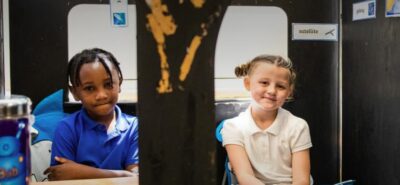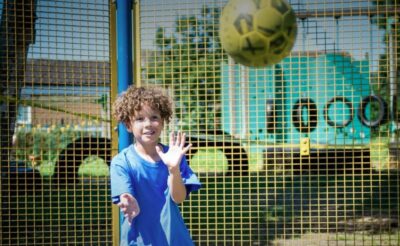Topcliffe School in Birmingham has achieved the Inclusive School Award.

Seven Resource Bases
Topcliffe School is located in the Castle Vale area of Birmingham and is part of the Washwood Heath Multi-Academy Trust. It is technically a one form entry school of 255 pupils. The figure for children identified as recipients of ‘Disadvantage’ funding is 66%. Fifty-seven children have an Education, Health and Care Plan (EHCP) and 54 of these children with Special Educational Needs and Disability (SEND) have identified Autism Spectrum Disorder (ASD) and/or Speech and Language needs. The unusual aspect of Topcliffe is that it has created seven resource bases, commissioned by Birmingham Local Authority SEND Services. Consequently, many of these children travel to Topcliffe from various areas of the city.
Ethos of Inclusivity
The ethos of inclusivity permeates Topcliffe and staff are working extremely hard to ensure children in resource bases are integrated as fully as possible into the life of the school, both academically and socially.
There is a healthy acceptance of the challenges presented and a clearly evident passion to support children and families to manage these, both in school and at home.
Parents spoke of the difficult time which their children had experienced in the early years of their education but of the massive progress they had made upon transfer to Topcliffe.
One stated that, when her son arrived in Year 3, he could not read or write but after a term he could do both. 
She ascribed this to a number of factors: careful placement of children in resource bases and the taking account of ‘stage not age’, if necessary, when addressing learning needs; a determination by the school to ensure that children with SEND follow the same school curriculum as others but with appropriate adaptations; having the security of working with the same teacher over several years; excellent communication between school and parents regarding progress and strategies; parental workshops on subjects such as sensory needs; ongoing support and guidance of parents by key staff of the school in signposting support agencies and always being available for advice and help when parents are experiencing strain and difficulties in ‘managing’ behaviours of some children at home. Staff are considered to be very approachable and follow up any concerns very quickly.
‘Timetabling’, staff allocation and the variety of interventions required are flexible in order to meet the needs of individual children. These are carefully mapped and pupils are placed in one of the seven resource bases whilst there are opportunities for them to participate in mainstream classes, as and when appropriate to do so. Resource base provision is overseen by a Deputy Headteacher, ably supported by a Resource Base SENDCo. They ensure consistency in use of curriculum material, manage specialist interventions from other agencies and also provide resources for parents to use with their children.
A further SENDCo focuses upon needs of children in mainstream classes. There is careful screening, identification and creation of Support Plans as required. Key strategies include a range of Reading Recovery activities, online intervention to address dyslexia issues and pre-teaching with targeted children.
Importance of Training
The importance of training for staff is undoubtedly recognised in creating highly skilled teachers and Teaching Assistants (TAs) with well equipped ‘tool boxes’ of strategies and resources. The school works very closely with an Occupational Therapist (OT) and Leadership have appointed an OT Champion, both of whom work closely with pupils (including screening all in Reception class) and staff, as do Speech and Language Therapists and ASD specialists.
All staff have received training in sensory needs, zones of regulation, Makaton and Picture Exchange Communication Systems (PECS). The use of various monitoring strands ensures that strategies are being used appropriately and consistently across the school and any developmental needs of staff can be addressed. There is a plan for Topcliffe staff to share SEND strategies and moderate provision across the MAT which is a major part of further development.
 Inclusivity is evident in the design and use of the environment since classrooms are carefully designed to give pupils maximum opportunity to explore, interact and create in rooms and/or areas designed for appropriate play, whilst other rooms/areas facilitate a more formal approach to academic learning. Similar furnishings provide familiarity for students who have a need for this because of their neurodiversity and their security is also supported through consistency of staffing as much as possible.
Inclusivity is evident in the design and use of the environment since classrooms are carefully designed to give pupils maximum opportunity to explore, interact and create in rooms and/or areas designed for appropriate play, whilst other rooms/areas facilitate a more formal approach to academic learning. Similar furnishings provide familiarity for students who have a need for this because of their neurodiversity and their security is also supported through consistency of staffing as much as possible.
Furthermore, TAs also work as lunchtime supervisors as they know children extremely well and have strong positive relationships with them. Topcliffe is fortunate to have ample outdoor space which is used to enhance excitement and facilitate a range of learning opportunities for all children.
Children have access to an attractive outdoor learning hub which is used by all classes and is a particularly valuable resource for SEND children. The large play area includes AstroTurf, on which both boys and girls play as well as a canal boat in dry dock which provides a calmer zone for leisure time. There are plans to turn a courtyard area into a sensory garden to complement the sensory room which is already available for pupils to use.
The school’s commitment to supporting all children to manage their neurodiversity and/or their mental health has been demonstrated through the purchase of a therapy swing which is administered by the Occupational Therapy Champion and has proved very valuable in promoting calmness, alertness and supporting sensory needs.
With the intention of maximising the potential to meet the needs and promote progression for all pupils, Leadership have recently taken the decision to adopt the Cornerstones Curriculum. Aspects of different cultures have been integrated into the design, widening the horizons and global understanding of pupils who live in a largely white British environment.
Social and Economic Pressures
Staff are acutely aware of the social and economic pressures which exist in the school’s local community and every effort is made to communicate with families and sensitively support with regard to domestic issues and child behaviour. Everyone is very aware that there is a culture and mantra of ‘No blame, no shame’. Consequently, there is an increased trust of the school by parents, several of whom have had negative school experiences themselves.
A Lead Mentor heads a team of three mentors which provides structure and opportunities for children to talk and share their feelings and concerns in an environment where they can feel safe and unthreatened and also be made aware of strategies which they can use to improve their wellbeing. Groups are dependent upon apparent needs at any time and currently a group of Year 3 boys, who all share issues post the disruption of the Covid pandemic, meet regularly.
The inclusion of a reception child in this group demonstrates the school’s willingness to be flexible in accommodating needs of individuals at any one time. In addition, a safeguarding group enables pupils to be supported and explore issues of domestic tensions, safety at home, depression and safety round strangers in an age-appropriate manner.
A Friday social group enables children to join with others in the safety and comfort of the mentor area, should they wish to do so. Sessions can lead to the involvement of a range of other agencies such as Spurgeons (a support agency for young carers), Early Help, the local nursery, the local Housing Association and Compass which offers family support resources on the local Castle Vale Estate.

Energy, Determination and Drive
Every effort is made to provide a range of activities off site. A school car and two minibuses enable trips to be organised without the expense of coach hire for parents and/or school. Topcliffe plays a significant part in supporting the local community and, ultimately, its own children and families. As part of Children in Need, for example, pupils brought food items into school as their contribution to the cause. These were then donated to the local food bank for distribution.
Regular meetings between school and local community groups and agencies ensure that there is an awareness of current issues and needs. Currently Topcliffe has engaged with the Dunelm Children of Need project to provide Christmas presents for targeted children in order that no child is without something which they would like.
The energy, determination and drive are evident, both individually and in teams. Topcliffe is passionately focused upon continuous improvement in order that systems, structures, excellent teaching and learning and a wealth of resources can provide a flexibility which will accommodate a wide range of children’s needs and help them to manage/overcome any barriers which they might have and explore their abilities and talents to their full potential, whether sporting, musical, artistic, academic or in any other area.
This desire is shared by all stakeholders, including Governors, who have confidence that Leadership take action to address any challenges they have, whether with levels of progress in Early Years in the past or issues of the financial cost of school uniforms. Knowledge and understanding are enhanced by regular learning walks by Governors. There is a strong sense that all involved in the education of children at Topcliffe know the school’s values and promote and live them in ways which impact positively on children’s experience, personal development and academic achievement.
Find out more about the IQM Inclusive School Award
If your school is interested in obtaining the IQM Inclusive School Award or you wish to talk to a member of the IQM team please telephone:
028 7127 7857 (9.00 am to 5.00 pm)
or email: [email protected] for further details.
Want more information on the IQM Award? Click here to request your free IQM information pack.